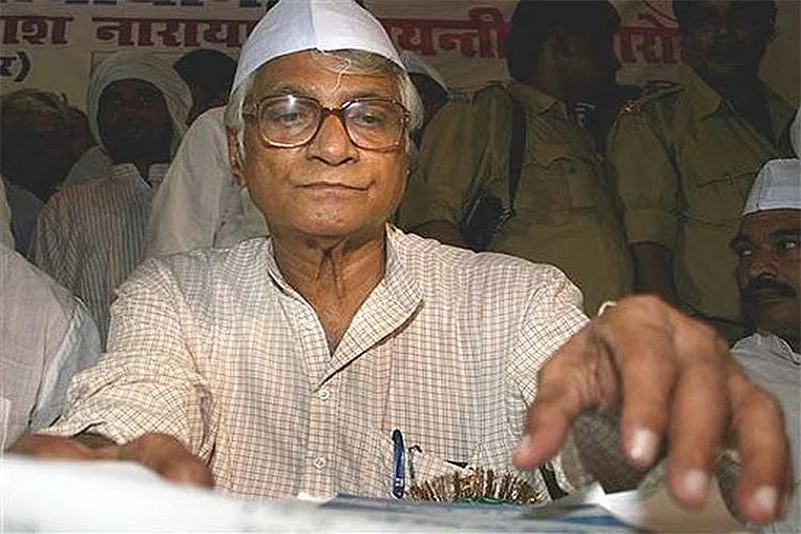After he was allocated the railways portfolio in 1989 in the V P Singh government, George Fernandes refused to go to Rail Bhavan to attend office for three days.
The reason behind this was simple: he had led the biggest railway strike in Asia in 1974 and headed railway unions and now how could he be sitting across them at the table?
This anecdote was shared by his close aide Jaya Jaitly in her book "Life Among the Scorpions", published in 2017.
Then after he joined office, the guard at the ministry's entrance did not let him in and told him to get an entrance slip made at the reception first.
She also mentioned several other interesting facts about Fernandes - his love for Harry Potter books, he never owned a comb, and devouring economic surveys and carrying them wherever he went.
Fernandes died Tuesday at the age of 88 in Delhi. He was suffering from Alzheimer's disease for several years and had recently contracted swine flu.
On the V P Singh ministry, Jaitly wrote: "In late 1989, as the National Front government set itself up, the walls of power came up alongside. V P Singh, with his typical caginess, kept even his closest colleagues on tenterhooks, informing them that they would become ministers only half an hour before they were expected to be sworn in."
Everyone seemed to be waiting anxiously for an advance indication from Singh but that did not happen.
"George Sahib nonchalantly went upstairs for an afternoon nap and had no time to change into a fresh kurta when he was woken up and told to reach Rashtrapati Bhavan in 20 minutes. His colleagues and I sat in the office downstairs in his tiny apartment at Hauz Khas, amazed at the lack of dignity in the way this was done. Everyone felt ridiculous," she wrote.
A day or so after the swearing in of the council of ministers, the portfolios were announced.
"George Fernandes was astounded that he had been allocated the Ministry of Railways. He said he had led the biggest railway strike in Asia and headed railway unions. How could he be sitting across them at the table now? For three days he refused to go to Rail Bhavan to attend office," the book, published by Rupa, said.
Finally, Singh assured him he would change his portfolio after three months but that never happened.
"George Fernandes went to office in his old diesel Premier Padmini car driven by his Mumbai colleague Freddie D'Sa. The guard at the Ministry's entrance wouldn't let him in and told him to get an entrance slip made at the reception first. He hadn't recognised the new boss who had arrived with no prior information or pomp and splendour," Jaitly said.
According to her, Fernandes was a man no one could ignore, his personality was such that he could never disappear into a crowd.
In the book, she recalled an incident "when we were once rushing down a railway platform somewhere in Maharashtra to catch a train, and someone had shouted out to him in Marathi, 'Hey, sir, you look like George Fernandes!' He had stopped only for a fraction of a second to answer in Marathi, Yes, many people have told me so.”
She also wrote that Fernandes never owned a comb.
"He was, in fact, presumed to be a rabble-rouser who never combed his hair or wore clean clothes. However, he was most sophisticated and meticulous about his personal appearance, bathing twice a day, and washing his own clothes every day till he was over 70 years old," she said.
Jaitly recalled that Fernandes read the "first lot of the Harry Potter books alongside biographies of world figures, the writings of Dr Ambedkar, Mahatma Gandhi, Winston Churchill, philosophical tomes or legal histories involving complicated international human rights cases".
"He particularly loved to devour economic surveys and carried them wherever he went, but occasionally bought the latest popular novel at an airport. He had a huge library in which there was no book he had not read at some time, including ones in Kannada and Hindi."
PTI
















